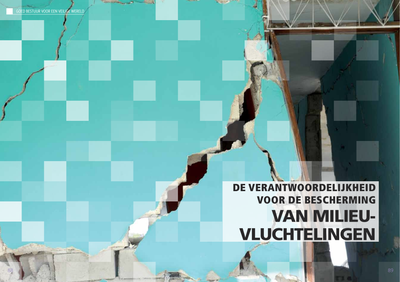Er is wereldwijd een groeiende groep milieuvluchtelingen waarvoor nog geen internationaal beschermingsregime bestaat. Het internationaal recht biedt geen adequaat antwoord. Dit artikel laat zien welke soorten milieuvluchtelingen bestaan, en zal betogen dat de bescherming van deze groep plaats kan vinden onder het VN-principe The Responsibility to Protect (R2P). Staten en de internationale gemeenschap hebben een zorgplicht voor milieuvluchtelingen. De basis hiervan ligt bij de Rechten van de Mens. De effectieve uitvoering van een aantal basisrechten wordt immers negatief beïnvloed door milieudegradatie. Tevens wordt staatssoevereiniteit steeds meer beschouwd als een verantwoordelijkheid. Via The Responsibility to Protect ontstaat er een integrale aanpak: 1) een staat is ten eerste zelf verantwoordelijk voor de bescherming van milieuvluchtelingen, 2) de internationale gemeenschap heeft een verantwoordelijkheid een staat hierbij te assisteren, en 3) indien een staat zijn milieuvluchtelingen niet wil of niet kan beschermen, verschuift de verantwoordelijkheid voor dit probleem naar de internationale gemeenschap, om collectief snel en beslissend te reageren. ABSTRACT The number of environmental refugees is growing, but an international legal protection regime is non-existent. This article shows eight different kinds of environmental refugees, and will argue that the protection of these groups can take place under the UN principle The Responsibility to Protect (R2P). States and the international community are obliged to help environmental refugees, based on the International Bill of Human Rights. The effective implementation of basic rights is influenced negatively by environmental degradation. Furthermore, changed notions regarding state sovereignty are also pointing at the responsibility of the state. The Responsibility to Protect (R2P) offers an integral approach: In first instance, the responsibility to take protective measures lies with the state itself. Secondly, the international community has a responsibility to assist. Lastly, when a state is not able or willing to protect its environmental refugees, the responsibility yields to the international community, to respond in a swift and decisive manner.
DOCUMENT

Indigenous rights’ relationship to ecological justice in Amazonia has not been explicitly explored in the literature. As social scientists rarely talk about violence against non-humans, this case study of conservation in Amazonia will explore this new area of concern. Ethical inquiries in conservation also engage with the manifold ways through which human and nonhuman lives are entangled and emplaced within wider ecological relationships, converging in the notion of environmental justice, which often fails to account for overt violence or exploitation of non-humans. Reflecting on this omission, this chapter discusses the applicability of engaged social science and conservation to habitat destruction in Amazonia, and broader contexts involving violence against non-humans. The questions addressed in this chapter are: is the idea of ecological justice sufficiently supported in conservation debate, and more practical Amazonian contexts? Can advocacy of inherent rights be applied to the case of non-humans? Can indigenous communities still be considered 'traditional' considering population growth and increased consumptive practices? Concluding that the existing forms of justice are inadequate in dealing with the massive scale of non-human abuse, this chapter provides directions for conservation that engage with deep ecology and ecological justice in the Amazonian context. doi: 10.1007/978-3-030-29153-2 LinkedIn: https://www.linkedin.com/in/helenkopnina/
MULTIFILE

In een sociaal-ecologisch rechtvaardige samenleving komt sociaal werk op voor mensen, groepen en gemeenschappen in een kwetsbare positie terwijl het tegelijkertijd streeft naar herstel en versterken van de natuur. Dit pleidooi vormt een eerste aanzet om sociaal werkers, opleidingen social work, organisaties voor sociaal werk en andere belangrijke betrokkenen aan te moedigen het gesprek hierover te voeren én een bijdrage aan een sociaal-ecologisch rechtvaardige samenleving te leveren. Auteurs: Richard de Brabander (lector Hogeschool Inholland), Josien Hofs (bestuurslid IFSW), Jeanet de Jong (beleidsadviseur BPSW), Christine Kuiper (voorheen Movisie), Maja Ročak (Fontys en Zuyd Hogeschool) en Mariël van Pelt (Fontys Hogeschool en Movisie)
DOCUMENT
